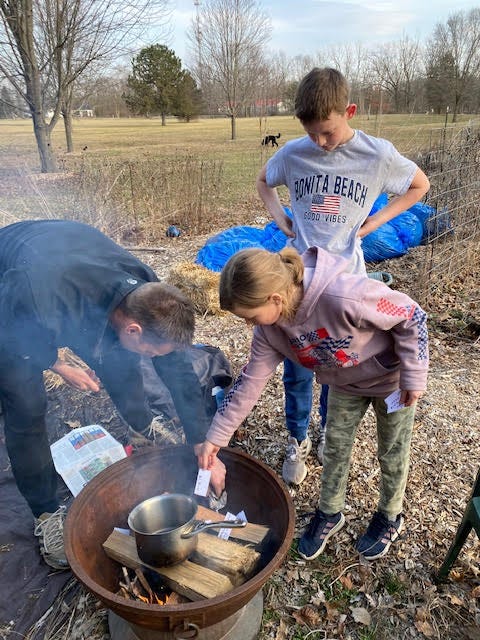This is the newsletter version of Sara by the Season, where I explore a little bit of everything that’s on my mind as I try to lean into nature’s wisdom and rhythms. You can listen to me read you the newsletter by hitting play above - or you can click the little link above and to the right to play in your favorite podcast player. If you know someone who would like this sort of thing, I’d be so grateful if you would share it!

I’ve written about systems problems here before, but watching Dopesick had me thinking about it in a little more ruthless way. Dopesick is a Hulu documentary based on the book by the same name by Beth Macy about how the under regulation and mislabeling of OxyContin due to falsifying studies and outright bribery by the drug’s manufacturer led to the opioid crisis.
The film and book tell the story about how Purdue Pharma, the company that manufactured and marketed OxyContin, defended themselves, as it became more and more apparent how addictive the drug was, by focusing on the narrative that the problem wasn’t with the drug itself, but that the problems were coming from individuals abusing the drug. There are several scenes in the film where Richard Sackler, the architect of the company’s most egregious lies and manipulations during the rise of Oxy, instructs his attorneys to “hammer the abusers,” keeping the focus on individuals instead of the addictive properties of his drug.
Here’s the thing with Sackler’s argument: it isn’t completely false. It’s just very incomplete and refuses to acknowledge any of his company’s responsibility in the wave of addiction caused by OxyContin. My very rough graph below isn’t based on anything but my own research on OxyContin and addiction, and this is my rough split of responsibility according to my own judgement (i.e. this is obviously not scientific):
Purdue misrepresented data, but then the FDA didn’t look at the data as closely as they should have. To me, Purdue and the FDA bare the brunt of the responsibility. Doctors and pharmacies were acting out of trust in the FDA’s process, but they also were on the frontlines to see the warning signs from the beginning. Individuals do bare some responsibility in the situation, but as there is a very strong tie between trauma and addiction, many of the people who eventually got addicted to opioids probably also had some deeper traumas that they were using an extremely addictive substance (that their doctors prescribed to them and told them was safe) to deal with.
Once I noticed this pattern in Dopesick, I started seeing it everywhere. People, especially people in power, want to blame individuals because that is easier and doesn’t require anything from them versus tackling the systems that led to or exacerbated the problem in the first place. A quick Google search of the news demonstrates this phenomenon all over the place:
The pandemic has exposed all sorts of systems failures (our healthcare system, how we think about work, public health communication, social media, to name a few), but instead of sitting back and looking at the big picture, the news - and our conversations - are filled with stories blaming individuals instead of doing the much harder work of rethinking the foundations of these systems that led to the failures we’re now seeing all over the place.
Every time a politician proposes more programs to help average Americans, you hear people (almost always Republicans) complain about so-called “welfare queens” (which is another instance of political opportunism instead of actual facts) versus looking at the systems that keep people in poverty and the relatively simple policy choices that we could make that are proven to help.
The NRA spends millions in lobbying lawmakers every year to keep Congress from passing saner gun laws (even though the vast majority of Americans - 80 - 90 percent! - favor common sense gun laws like background checks, an assault weapons ban, and preventing people with mental illnesses from purchasing guns). Then there’s another school shooting, and the NRA and its cronies blame the individual with the gun (“guns don’t kill people, people kill people”) instead of looking at how easy the system makes it for individuals to obtain guns in the first place.
The fossil fuel industry funds marketing campaigns to encourage individual responses to climate action because that keeps the heat off of them to reduce emissions, something that would do far more to alleviate the oncoming climate disaster than individuals recycling or eating less commercially-farmed animal products. But if they keep individuals feeling guilty about their consumption, it keeps the pressure off of the industry as it spends millions to block meaningful climate action.
Republicans use abortion to get voters in line because women who want or need abortions are easy targets (and because they want power over women’s bodies). But they don’t actually care about reducing the number of abortions because the data is very clear on what policies reduce abortions - and Republicans by in large don’t support systemic policies that decrease actual abortions. They would rather keep attacking individual women versus setting policy that would create conditions in which less women need abortions.
People are crippled by college debt, but instead of using that as a signal that the higher education system is broken, we all just keep participating in this same cycle and blaming the individuals themselves for going into so much debt.
Companies and politicians celebrate International Women’s Day instead of actually paying women what they deserve or passing legislation that would help balance out centuries of oppression and inequity. (Same goes for Black History Month, Indigenous People’s Month, and so on of course.)
A way people in power stay in power (whether that’s the executives at Purdue Pharma or politicians or billionaires) is by gaslighting us into thinking our problems are just about us not working hard enough or being too sensitive or not being smart enough instead of taking the time to see that so many of our problems look like my pie graph above. Yes, we bare some responsibility (and in some cases, most of the responsibility), but there are often - if not always - other factors at play.
It goes back to the idea I wrote about here about being a jerk or a doormat. We keep thinking that our options available to us are dualistic when, really, there are a plethora of solutions needed and available to us. But getting stuck thinking that the problems we face are just because we’re too much this or not enough that keep us from acting in ways to confront the systems working against us, our communities, and our places. And by allowing ourselves to stay mired in arguing about individual problems instead of systemic ones, the forces in power stay in power and keep playing the same game.
Rants and raves
👍 It’s snowing as I write this. The fact that I’m not mad about that is a sign that I need more wintering.
👍 An entire Substack dedicated to, as my friend Nan who sent it to me said, “the mind fuckery of the beauty industry?” YES PLEASE.
👎 The truth of this Tweet won’t get out of my head:

Stuff worth sharing
My long-delayed what I’m learning and loving lately post over on the neglected blog. I love this practice and had missed it. I don’t like to should people, but I really think you’d be glad if you take up this practice for yourself.
Another Atlantic headline that sounds like the conversations Grant and I keep having: The grown-ups are losing it.
I wonder if we’ll look back and see this Ukrainian initiative as part of the glue that helped hold the country together during this impossible time. (It also has me imagining the ways in which we could incentivize culture-making instead of spinning our wheels fear-mongering about our refusal to face our history).
Cheers to asking yourself, is this a me-problem or a system-problem?, in the week ahead!
Sara















Share this post